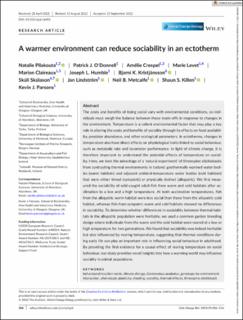A warmer environment can reduce sociability in an ectotherm
Pilakouta, Natalie; O'Donnell, Patrick J.; Crespel, Amélie; Levet, Marie; Claireaux, Marion; Humble, Joseph L.; Kristjánsson, Bjarni K.; Skúlason, Skúli; Lindström, Jan; Metcalfe, Neil B.; Killen, Shaun S.; Parsons, Kevin J.
Peer reviewed, Journal article
Published version
Permanent lenke
https://hdl.handle.net/11250/3044028Utgivelsesdato
2022Metadata
Vis full innførselSamlinger
- Articles [3012]
- Publikasjoner fra CRIStin [3070]
Sammendrag
The costs and benefits of being social vary with environmental conditions, so individuals must weigh the balance between these trade-offs in response to changes in the environment. Temperature is a salient environmental factor that may play a key role in altering the costs and benefits of sociality through its effects on food availability, predator abundance, and other ecological parameters. In ectotherms, changes in temperature also have direct effects on physiological traits linked to social behaviour, such as metabolic rate and locomotor performance. In light of climate change, it is therefore important to understand the potential effects of temperature on sociality. Here, we took the advantage of a ‘natural experiment’ of threespine sticklebacks from contrasting thermal environments in Iceland: geothermally warmed water bodies (warm habitats) and adjacent ambient-temperature water bodies (cold habitats) that were either linked (sympatric) or physically distinct (allopatric). We first measured the sociability of wild-caught adult fish from warm and cold habitats after acclimation to a low and a high temperature. At both acclimation temperatures, fish from the allopatric warm habitat were less social than those from the allopatric cold habitat, whereas fish from sympatric warm and cold habitats showed no differences in sociability. To determine whether differences in sociability between thermal habitats in the allopatric population were heritable, we used a common garden breeding design where individuals from the warm and the cold habitat were reared at a low or high temperature for two generations. We found that sociability was indeed heritable but also influenced by rearing temperature, suggesting that thermal conditions during early life can play an important role in influencing social behaviour in adulthood. By providing the first evidence for a causal effect of rearing temperature on social behaviour, our study provides novel insights into how a warming world may influence sociality in animal populations.
